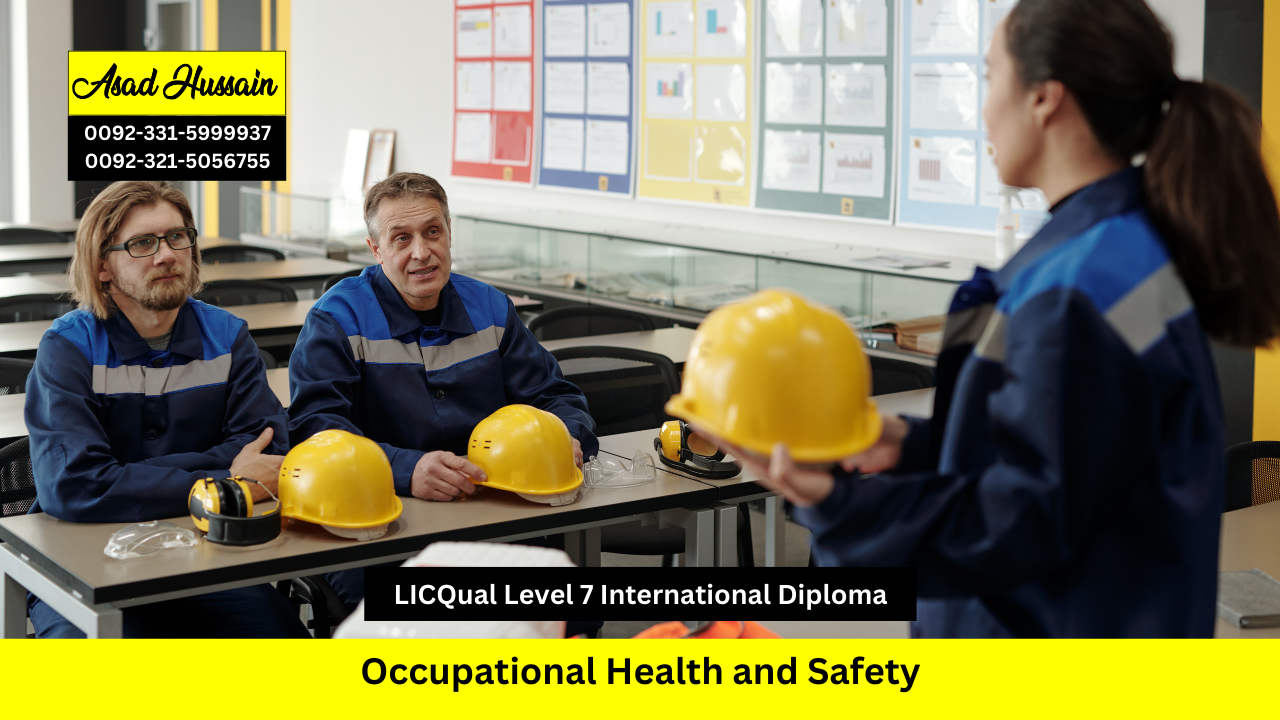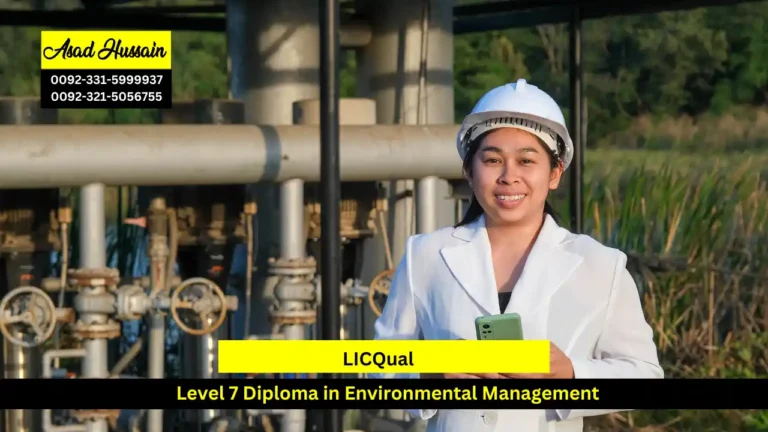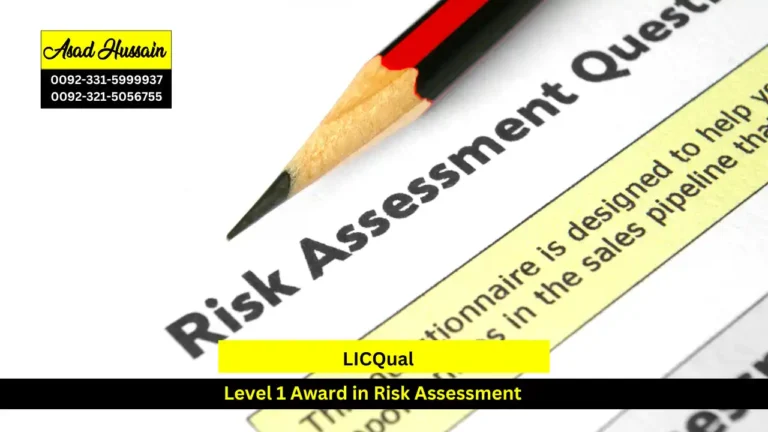The diploma is a prestigious qualification designed for professionals seeking to assume executive and strategic roles in workplace safety management. In an era where global industries are increasingly regulated and safety-critical, organizations require leaders who can implement advanced safety strategies, ensure compliance with international standards, and foster a culture of health and safety excellence.
LICQual Level 7 International Diploma in Occupational Health and Safety provides learners with comprehensive knowledge and practical expertise to manage complex health and safety systems across diverse organizational environments. Participants will gain insights into global regulatory frameworks, strategic risk management, leadership in safety culture, emergency preparedness, and crisis management. The diploma emphasizes applied learning, equipping learners to make informed decisions, develop policies, and lead initiatives that safeguard employees and protect organizational assets.
Through a combination of theoretical instruction, case studies, and practical applications, learners will develop the skills needed to conduct advanced risk assessments, oversee accident investigations, implement emergency plans, and drive continuous improvement in occupational health and safety practices. Graduates of this program will be prepared for senior roles such as international safety managers, consultants, and directors of occupational health and safety across sectors including construction, manufacturing, energy, and corporate organizations.
Completing the diploma positions learners as expert leaders capable of shaping workplace safety policies, ensuring global compliance, and fostering a proactive safety culture that enhances organizational resilience.
Program Highlights
Mandatory Units
- International Health and Safety Legislation
- Strategic Risk Management
- Health and Safety Leadership and Culture
- Health and Safety Management Systems
- Incident Investigation and Reporting
- Emergency Preparedness and Crisis Management
To ensure learners are fully prepared for the diploma , the following entry requirements are recommended. These standards help participants engage effectively with advanced content and achieve professional success.
Age Requirements
- Applicants should be 24 years or older to enroll in this Level 7 program.
- Mature learners with substantial professional experience may also be considered.
Educational Requirements
- A Level 6 qualification in Occupational Health and Safety or an equivalent discipline is recommended.
- Candidates with professional certifications and strong academic or managerial backgrounds in health and safety may also qualify.
Professional Experience
- Applicants should have significant experience in health and safety, risk management, or leadership roles.
- Professionals with responsibility for organizational safety strategy or international compliance will benefit most from this course.
English Language Proficiency
- Proficiency in English is required to engage with complex technical content and complete assessments.
- Non-native English speakers may need to provide proof of language proficiency through recognized tests or prior qualifications.
These entry requirements are designed to ensure that learners can fully engage with advanced occupational health and safety content, develop strategic leadership capabilities, and achieve professional recognition. Meeting these standards prepares participants to excel in the diploma and pursue senior, globally recognized roles in workplace safety management.
Upon completing the diploma y, learners will acquire advanced knowledge, practical skills, and strategic expertise to manage occupational health and safety in complex organizational and international contexts. The learning outcomes are designed to ensure measurable competence in legislative compliance, risk management, leadership, incident investigation, emergency preparedness, and the development of a proactive safety culture.
1. International Health and Safety Legislation
Upon completion, learners will be able to:
- Analyze international health and safety legislation, standards, and frameworks to ensure organizational compliance and ethical workplace practices.
- Evaluate the impact of regulatory requirements on different industries and develop strategies for integrating them into organizational policies.
- Apply principles of law and governance to conduct health and safety audits and inspections effectively.
- Formulate compliance strategies and policy recommendations for multinational or local organizations.
2. Strategic Risk Management
Upon completion, learners will be able to:
- Assess organizational risks using qualitative and quantitative methods to identify hazards, vulnerabilities, and risk exposure.
- Develop and implement comprehensive risk management frameworks aligned with international best practices.
- Integrate risk assessment findings into strategic decision-making to enhance workplace safety and operational efficiency.
- Utilize data-driven approaches to monitor, review, and improve risk mitigation measures.
3. Health and Safety Leadership and Culture
Upon completion, learners will be able to:
- Demonstrate leadership skills to cultivate a strong safety culture and encourage proactive health and safety practices.
- Design and implement initiatives that motivate employees and stakeholders to prioritize health and safety in everyday operations.
- Evaluate organizational culture and recommend improvements to promote behavioral safety and ethical practices.
- Lead cross-functional teams to enhance safety awareness, engagement, and accountability.
4. Health and Safety Management Systems
Upon completion, learners will be able to:
- Develop and manage comprehensive health and safety management systems aligned with ISO 45001 and other international standards.
- Conduct system audits and assessments to ensure continuous improvement in health and safety performance.
- Apply best practices in documentation, reporting, and management review processes to maintain compliance and effectiveness.
- Integrate organizational policies, procedures, and processes to achieve operational excellence in safety management.
5. Incident Investigation and Reporting
Upon completion, learners will be able to:
- Conduct thorough investigations of workplace incidents, accidents, and near-misses using root cause analysis techniques.
- Prepare detailed, accurate, and legally compliant incident reports for internal and external stakeholders.
- Recommend corrective actions and preventive measures based on investigation findings to minimize recurrence.
- Utilize incident data to drive organizational learning, policy refinement, and safety improvements.
6. Emergency Preparedness and Crisis Management
Upon completion, learners will be able to:
- Design and implement emergency response plans, procedures, and protocols for various workplace scenarios.
- Conduct risk assessments for potential crises and develop mitigation strategies to safeguard personnel and assets.
- Lead crisis management teams and coordinate emergency response efforts effectively.
- Evaluate emergency exercises and drills to enhance preparedness and organizational resilience.
By achieving these learning outcomes, learners will demonstrate the ability to lead health and safety initiatives, implement effective management systems, and respond strategically to emergencies and crises. They will be prepared to influence policy, drive organizational change, and promote a culture of safety across industries. These outcomes ensure that graduates not only meet international standards but also contribute meaningfully to creating safer and more sustainable work environments globally.
The LICQual Level 7 International Diploma in Occupational Health and Safety is suitable for professionals, educators, and career-minded individuals who aim to advance their expertise in occupational health and safety leadership. It is designed for learners seeking both strategic and practical knowledge applicable in global industries, regulatory environments, and policy-making sectors.
Educational Instructors and Trainers
- Deliver advanced health and safety training using international standards and best practices.
- Design curricula and learning modules to equip students and professionals with practical, real-world safety skills.
Environmental Advocates and Activists
- Promote workplace health, safety, and sustainability initiatives.
- Influence policies and community programs to ensure safer, environmentally responsible practices.
Students and Recent Graduates
- Acquire specialized knowledge and skills to start a career in occupational health and safety management.
- Prepare for leadership roles in industries that require compliance with global safety standards.
Career Changers
- Transition into occupational health and safety roles with internationally recognized qualifications.
- Enhance employability and career prospects through advanced, applied learning.
Policy Makers and Regulators
- Develop, enforce, and evaluate health and safety policies and regulatory frameworks.
- Ensure organizational compliance with international legislation while promoting safer work environments.
This program is ideal for ambitious professionals and learners seeking to lead, innovate, and influence health and safety practices globally. By completing this diploma, learners will emerge as confident, strategic, and effective health and safety leaders capable of making a measurable impact in their organizations and communities







